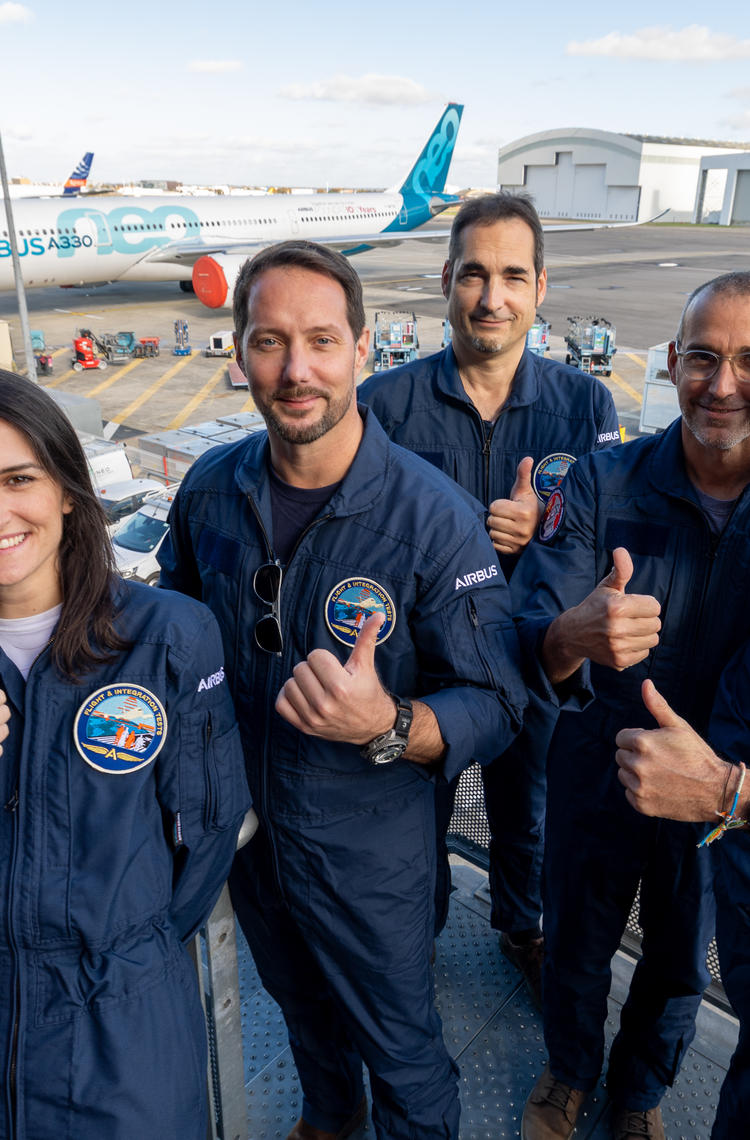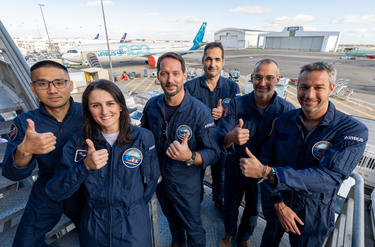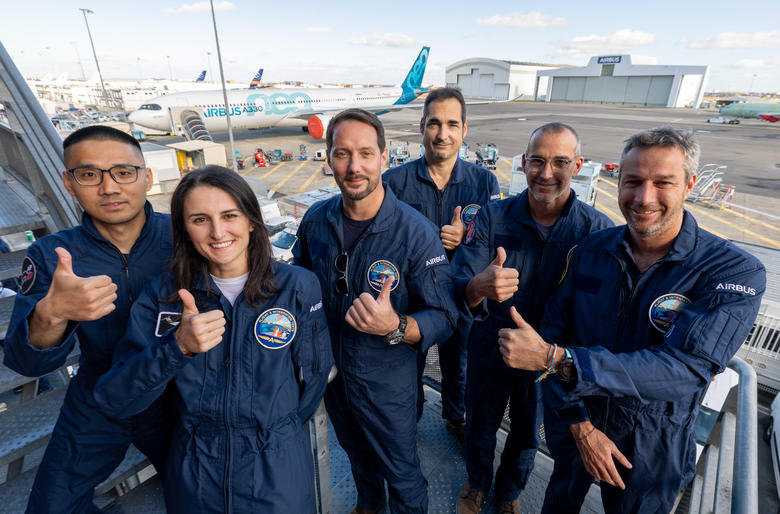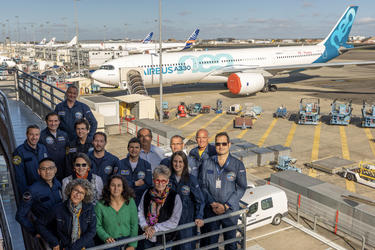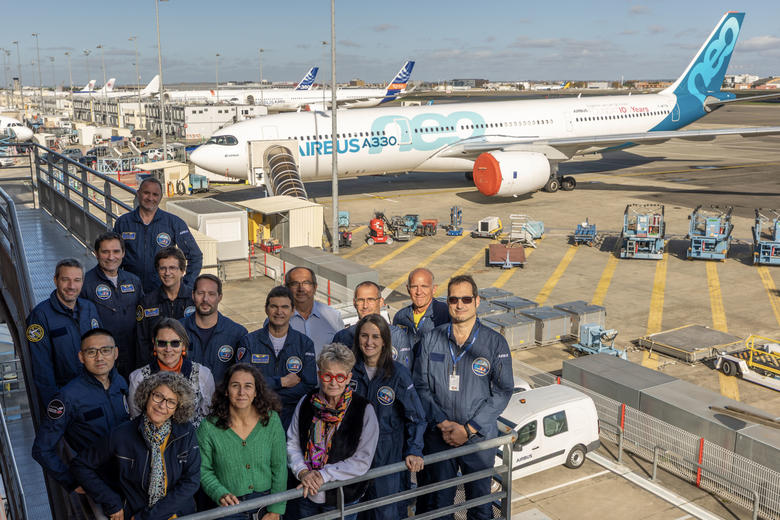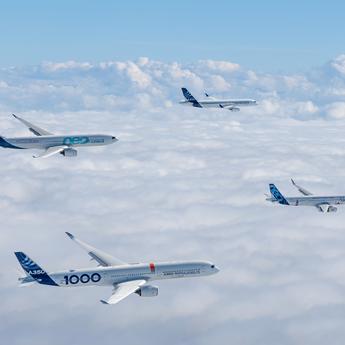You may know him as the European Space Agency astronaut who has spent close to 400 days onboard the International Space Station (ISS). But for the next few months, Thomas Pesquet is trading his space suit for a blue Airbus flight suit and swapping orbit for Toulouse, Planet Earth. He’s joining the company’s Flight Test School ‘Class of ‘26’. His mission? To qualify as a flight test pilot. Read on to discover why.
From the ISS to the Moon, via Airbus
"Space and aviation go hand in hand," Pesquet says, speaking from the Airbus Flight Test centre near Toulouse, France. "The way to interface with the vehicle is the same. The systems are very much the same, the dangers are the same – fire, depressurisation, loss of control. The best training for a space mission is actually flying airliners."
Pesquet notes that the skills learned in an aircraft cockpit, such as crew resource management, teamwork and grace under pressure transfer directly to piloting a space capsule. The parallels are useful because his Airbus training programme has a very specific goal: the Moon, as part of NASA’s Artemis programme.
While missions to the ISS are now known territory, Artemis, supported by the European Space Agency (ESA) and Airbus among others, is pushing into a new frontier. "Artemis vehicles are being tested as we speak," Pesquet says. "For that reason, there's a lot of emphasis on test pilot qualifications. It's written in black and white that some of the mission’s crew members will need to have those qualifications."
By earning his test pilot wings, Pesquet is positioning himself – and Europe – for a seat on one of those lunar missions. His time at Airbus has a symbolic value, too: it shows the importance of collaboration in the aerospace industry, and among the institutions and players that share its ambition.
A long-time connection to Flight Test
Thomas Pesquet is no stranger to Airbus cockpits. Before his astronaut career, he flew the A320 for Air France. After his time onboard the ISS, Pesquet flew the A310 on parabolic research flights. He’s also a reservist A330 pilot for the French Air Force.
Pesquet and the Airbus Flight test team have known each other, and flown together, since 2018. “They offered that I could come once in a while,” he says. "I've been doing this entirely on my own time out of my passion for flying. It’s the logical next step to be able to do more and do better."
Ready for the challenge
Jean-Philippe Cottet, head of Airbus Flight Tests, is proud to welcome such a space celebrity and high-profile student, but makes it clear the path is demanding. "Thomas will be a student like the others," says Cottet. "He will follow the classroom sessions, prepare and execute tests on many different types of aircraft, and analyse the results. The engagement and focus required are high."
The astronaut says he’s ready for the challenge: "The first phase is the theory. Opening your textbooks, getting back into those pesky equations." Then the flight phase begins, running from January to July. "That's going to be on all types of aircraft," Pesquet adds, "from the smallest one for aerobatics to the A350-1000... all kinds of aircraft."
An investment in European aerospace
The collaboration benefits everyone. Pesquet gains a critical qualification for future space missions. Airbus gains an astronaut’s unique perspective and an extra pair of test piloting hands, just as the company ramps up production of all its commercial aircraft programmes.
"I have wide experience in different types of man-machine interfaces," Pesquet notes, referencing his time on the Russian Soyuz and the SpaceX Dragon. "This is something that I'm trying to bring into what I'm doing, trying to think outside the box."
For Airbus and ESA, it’s a shared investment in the future of European aerospace as it faces launcher and satellite competition from new entrants. As Airbus’ Cottet puts it, "the collaboration shows the high level of confidence ESA has in Airbus. It’s great recognition of the quality of our training."
The Class of ‘26, which includes another pilot and four flight test engineers, will graduate next July. That coincides with the 80th anniversary of EPNER, the prestigious French test pilot school that will oversee their final graduation. It will be a special time for the Airbus Flight Test School too, as validation as an Approved Training Organisation expected to land during the year.
For now, one of the world's most experienced astronauts is once again a space cadet, ready to learn and shooting for the Moon.
